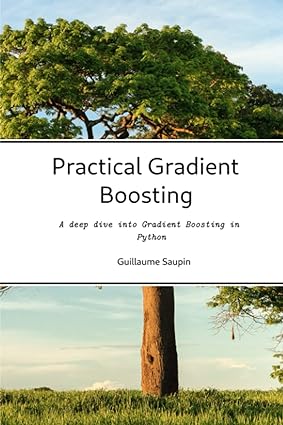Go back


Practical Gradient Boosting An Deep Dive Into Gradient Boosting In Python(1st Edition)
Authors:
Dr Guillaume Saupin

Cover Type:Hardcover
Condition:Used
In Stock
Shipment time
Expected shipping within 2 DaysPopular items with books
Access to 30 Million+ solutions
Free ✝
Ask 50 Questions from expert
AI-Powered Answers
✝ 7 days-trial
Total Price:
$0
List Price: $29.75
Savings: $29.75(100%)
Solution Manual Includes
Access to 30 Million+ solutions
Ask 50 Questions from expert
AI-Powered Answers
24/7 Tutor Help
Detailed solutions for Practical Gradient Boosting An Deep Dive Into Gradient Boosting In Python
Price:
$9.99
/month
Book details
ISBN: B0BJ82S916, 979-1041503582
Book publisher: AFNIL
Get your hands on the best-selling book Practical Gradient Boosting An Deep Dive Into Gradient Boosting In Python 1st Edition for free. Feed your curiosity and let your imagination soar with the best stories coming out to you without hefty price tags. Browse SolutionInn to discover a treasure trove of fiction and non-fiction books where every page leads the reader to an undiscovered world. Start your literary adventure right away and also enjoy free shipping of these complimentary books to your door.
Book Summary: This book on Gradient Boosting methods is intended for students, academics, engineers, and data scientists who wish to master XGBoost, LightGBM or CatBoost. They will discover in depth the functioning of Gradient Boosting used to build decision tree ensembles. All the concepts are illustrated by examples of application code. They allow the reader to rebuild from scratch their own XGBoost like library. In parallel, the book presents the best practices of Data Science and provides the reader with a solid technical background to build Machine Learning models. After a presentation of the principles of Gradient Boosting citing the application cases, advantages and limitations, the reader is introduced to the details of the mathematical theory. A simple implementation is given to illustrate how it works. The reader is then armed to tackle the application and configuration of these methods. Data preparation, training, explanation of a model, management of Hyper Parameter Tuning and use of objective functions are covered in detail! The last chapters of the book extend the subject to the application of Gradient Boosting for time series, the presentation of the emblematic libraries XGBoost, CatBoost and LightGBM as well as the concept of multi-resolution models.
Customers also bought these books
Frequently Bought Together
Top Reviews for Books
Sohel Ahmed
( 5 )
"Delivery was considerably fast, and the book I received was in a good condition."










